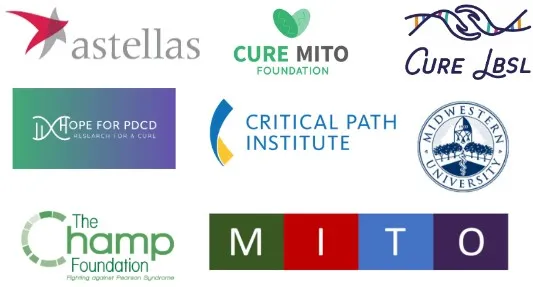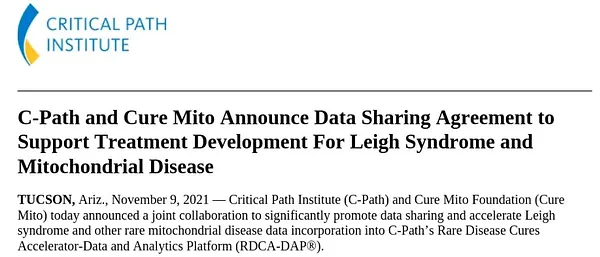This new task force is allowing our community to collaborate, share data, and accelerate development of treatments.
Ben, Austria
What is C-Path
C-Path’s Rare Diseases Cures Accelerator – Data Analytics Platform (RDCA-DAP®) is an FDA-funded initiative establishing a centralized and standardized infrastructure. This platform facilitates the sharing of crucial data across rare diseases, enabling integration and standardization of diverse data types, e.g., registry, trials.
Mission
Standardizing and integrating mitochondrial and inherited metabolic diseases data into the RDCADAP®.
Optimizing clinical trial design and endpoints.
Enhancing communication and collaboration among stakeholders, and the medical and research communities at large, all aimed at improving the lives of those affected by these diseases.
Why share data?
By participating or sharing data with C-Path your data is entrusted to a neutral entity with expertise in data governance, sharing, proper data aggregation and analytics, and working with regulatory bodies.
Data contributors decide how their data is shared and used.
All of this together has the maximum chance of benefiting as many people living with mitochondrial and metabolic diseases as possible.
Taskforce Members
- Astellas Pharma Inc.
- Barth Syndrome Foundation
- CortexBio
- Cure ARS
- Cure LBSL Foundation
- Cure Mito Foundation
- Global Genes: Rare-X Platform
- Hope for PDCD
- LHON Collective
- Lily Foundation
- Mepan Foundation
- MitoAction
- MitoCanada
- Mitochondria World
- Midwestern Washington University
- National Institutes of Health
- Sanford Research
- TGEN
- The Champ Foundation
- Newcastle upon Tyne
- Washington University in St. Louis School of Medicine

January 2024: A new C-Path Task Force Aimed at Accelerating Drug Development for Mitochondrial and Metabolic Diseases is launched!
This new task force will allow our community to collaborate, share data, and accelerate development of treatments with the support of C-Path and their Rare Disease Cures
Accelerator-Data and Analytics Platform (RDCA-DAP ® ). RDCA-DAP is an FDA-funded platform that creates the collaborative, non-competitive space to share existing patient-level data and encourages the standardization of new data collection.
November 2021: C-Path and Cure Mito Announce Data Sharing Agreement to Support Treatment Development For Leigh Syndrome and Mitochondrial Disease
Critical Path Institute (C-Path) and Cure Mito Foundation (Cure Mito) today announced a joint collaboration to significantly promote data sharing and accelerate Leigh syndrome and other rare mitochondrial disease data incorporation into C-Path’s Rare Disease Cures Accelerator-Data and Analytics Platform (RDCA-DAP®).

PRESS RELEASE
Leigh Syndrome, also known as Leigh disease, is a Mitochondrial disorder that affects about 1 out of 77,000 live births, with symptoms often appearing within the first year of life. It is a debilitating neurological disorder that can affect the development of mobility, posture and mental capacities in children, with these capabilities occasionally being lost after a period of seemingly normal growth. Though unusual, symptoms may not show until the early adult years, while others may show gradual signs throughout infancy.
“Progress towards the establishment of approved therapies for people with Leigh syndrome and other rare mitochondrial diseases is reliant on the participation of organizations like the Cure Mito Foundation,” said RDCA-DAP Scientific Director Alexandre Betourne, Ph.D., Pharm.D. “This is a laudable step in that direction, and we are thrilled to be partnering with Cure Mito to promote data sharing, standardization and develop tools that will accelerate the development of treatments for Leigh syndrome and other mitochondrial disorders.”
“Patients enroll in registries and research studies hoping that their participation will matter,” said Sophia Zilber, Cure Mito board member. “Cure Mito Foundation recognizes this and is committed to advancing the way data is collected, accessed and used, and empowering the patient community to be informed and active contributors of their data to advance research, treatments and eventually cures. We are proud to partner with C-Path in these important and much needed efforts.



